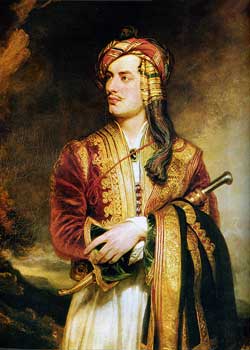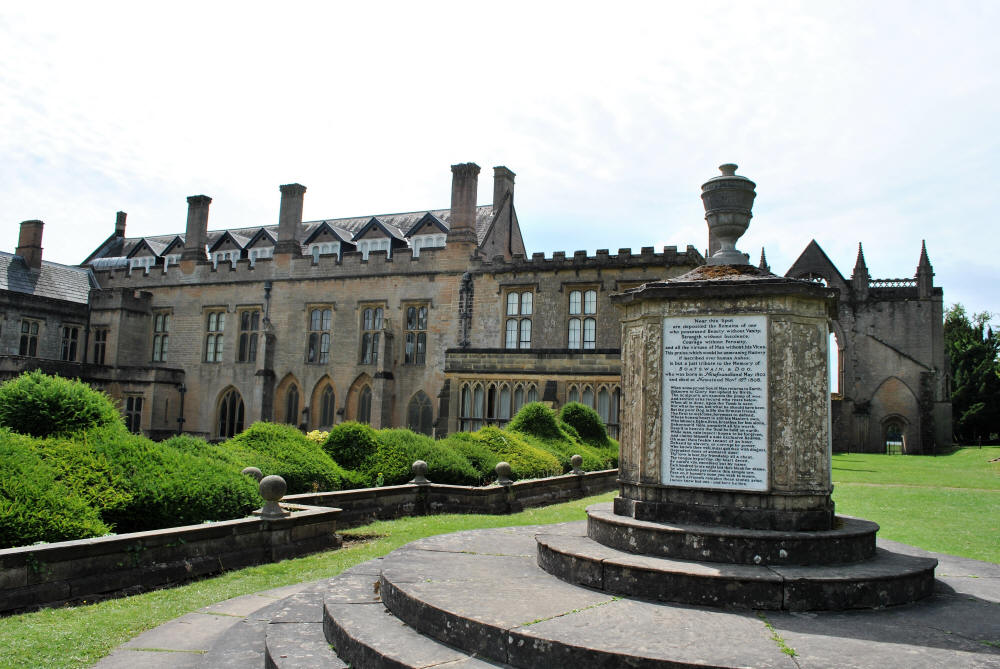

Queer Places:
Aberdeen Grammar School, Skene St, Aberdeen AB10 1HT, Regno Unito
Harrow School, 5 High St, Harrow HA1 3HP, Regno Unito
University of Cambridge, 4 Mill Ln, Cambridge CB2 1RZ
Newstead Abbey, Nottingham NG15 8GE, Regno Unito
Via Giuseppe Garibaldi, 6, 50123 Firenze FI
St Mary Magdalene, 8 Watnall Rd, Hucknall, Nottingham NG15 7LE, Regno Unito
Westminster Abbey, 20 Deans Yd, Westminster, London SW1P 3PA, Regno Unito
 George Gordon Byron, 6th Baron Byron FRS (22 January 1788 – 19 April 1824),
known as Lord Byron, was an English nobleman, poet, peer, politician, and
leading figure in the Romantic movement. He is regarded as one of the greatest
British poets[1]
and remains widely read and influential. Among his best-known works are the
lengthy narrative poems Don Juan and Childe Harold's Pilgrimage
as well as the short lyric poem "She Walks in Beauty".
George Gordon Byron, 6th Baron Byron FRS (22 January 1788 – 19 April 1824),
known as Lord Byron, was an English nobleman, poet, peer, politician, and
leading figure in the Romantic movement. He is regarded as one of the greatest
British poets[1]
and remains widely read and influential. Among his best-known works are the
lengthy narrative poems Don Juan and Childe Harold's Pilgrimage
as well as the short lyric poem "She Walks in Beauty".
Often described as the most flamboyant and notorious of the major Romantics, Byron was both celebrated and castigated in his life for his aristocratic excesses, which included huge debts, numerous love affairs with both men and women, as well as rumors of a scandalous liaison with his half-sister.[4] His only legitimate child, Ada Lovelace, is regarded as the first computer programmer based on her notes for Charles Babbage's Analytical Engine.[5][6][7] Byron's illegitimate children include Allegra Byron, who died in childhood, and possibly Elizabeth Medora Leigh.
Byron loved his schooldays at Harrow, where "my school friendships were with me . passions. That with Lord Clare began one of the earliest and lasted longest... I never hear the word "Clare" without a beating of the heart even now, and I write it with the feelings of 1803-04 ad infinitum." John FitzGibbon, 2nd Earl of Clare, was a pretty boy, one of those juniors whom Byron "spoilt by indulgence"; as usual in this hot-house atmosphere, there were jealous pangs, sometime ruptures, ups and downs like a temperature chart. At one point Clare was jealous, then there was a reconcilation: but it was Byron, with his imagination, to whom these affairs mattered most, who recorded them: sometimes they led to poetry. Several years later Byron and Clare met on a road in Italy - Byron recognized the face in an approaching carriage. "This meeting annihilated for a moment all the years between the present time and the days of Harrow. Clare, too, was much agitated - more in appearance than even myself; for I could feel his heart beat to his fingers' ends... We were but five minutes together, and in the public road; but I hardly recollect an hour of my existence which could be weighted against them." This was 1821. They promised to meet again, and did so next year. "As I have always loved him (since I was 13 at Harrow)... I need hardly say what a melancholy pleasure it was to see him for a day only." Clare was on his way homewards. "I have a presentiment that I shall never see him more," Byron said, his eyes filling with tears.
Arthur Meeker owned Lord Byron, 1826, by Thomas Sully, inherithed by his
father who bought it in the 1920s

Newstead Abbey
St Mary Magdalene, 8 Watnall Rd, Hucknall, Nottingham
Westminster Abbey, London
At Cambridge Byron had reacted rather against the libertinism of his naughty friends, like William Bankes and Charles Skinner Matthews, who allowed themselves not only liberties of speech. This may partly account for the effect upon his imagination of his love for the choirboy, John Edleston, which may have been largely Platonic. Byron was attracted by the boy's voice in Trinity Chapel - it is his voice that recurs in several poems. Then Byron fell for his charming disposition. Edleston began to come round to his rooms of an evening, where they talked music and poetry together. "His voice first attracted my attention, his countenance fixed it, and his manners attached me to him forever... I certainly love him more than any human being, and neither time or distance have had the least effect on my (in general) changeable disposition. During the whole of my residence at Cambridge we met every day, summer and winter, without passing one tiresome moment." On a return to Cambridge from the baronial gradeur of Newstead Abbey, "Edleston called on me last night... He is exactly to an hour two years younger than myself. I found him grown considerably and very glad to see his former Patron. He is nearly my height, very thin, very fair complexion, dark eyes, and light locks. My opinion of his mind you already know; I hope I shall never have occasion to change it." When Edleston went into trade in London, stories of an accusation of "indecency" reached Byron in Greece, and shortly afterwards, in 1811, Edleston died. Byron was deeply affected: "I heard of a death the other day that shocked me more than any, of one whom I loved more than any, of one whom I loved more than I ever loved a living thing, and one who, I believe, loved me to the last."
Lord Byron wrote to Charles Skinner Matthews in 1809, "We are surrounded by Hycianths (Hyacinth retained its innuendo, and a narcissus was an attractive younger man)," as sexually available youths in Georgian England were often termed, "& other flowers of the most fragrant nature, & I have some intention of culling a handsome Bouquet to compare with the exotics I hope to meet in Asia." Matthews' reply is even more botonically precising, and puns on the makeup of the poet's "anthology": "As to your Botanical pursuits, I take it that the flowers you will be most desirous of culling will be of the class polyandria (with stamens) and not monogynia but nogynia... If you should find anything remarkable in the botanical line, pray send me word of it, who take an extreme interest in your anthology."
Lord Byron travelled extensively across Europe, especially in Italy, where he lived for seven years in the cities of Venice, Ravenna and Pisa. During his stay in Italy he frequently visited his friend and fellow poet Percy Bysshe Shelley.[2] Later in life Byron joined the Greek War of Independence fighting the Ottoman Empire, for which Greeks revere him as a national hero.[3] Two Greek youths attached themselves to him, "my dearly beloved Eustathius Georgiou and Nicolo Giraud", with half-a-dozen ragazzi: "We have nothing but riot from morning till night. I am in fact at school again and make as little improvement as I did then, my time being wasted in the same way." At Missolonghi, at the end, Byron was attended by a Greek youth, Lukas Chalandritsanos (1809-1832?), sullen and unresponsive, about whom Byron wrote his last love poem.
Lord Byrondied in 1824 at the age of 36 from a fever contracted in Missolonghi.
My published books: